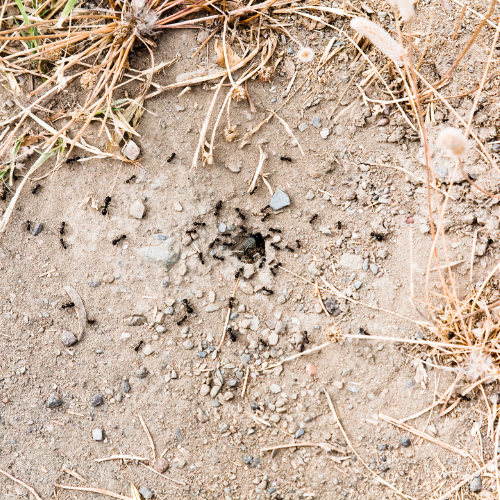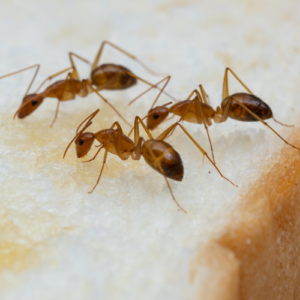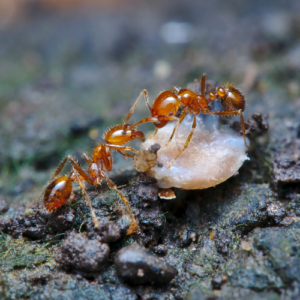
13 Mar Preventing Ant Colonies in Your Home
Navigating Ant Challenges in South Florida
In the warm and humid climate of South Florida, ants can be a common and persistent problem for homeowners. These tiny invaders are not just a nuisance; they can also pose health risks and cause damage to your property. But fear not! With the right knowledge and strategies, you can prevent ant colonies from taking over your home.
Ants are social insects that live in colonies, often with thousands of members. They are attracted to homes in search of food, water, and shelter. Once they find a reliable source, they leave a pheromone trail for other ants to follow, quickly leading to an infestation.
The diversity of ant species in South Florida adds to the challenge of control. From the tiny ghost ant to the aggressive fire ant, each species requires a different approach. Understanding their habits and preferences is crucial for effective prevention and management.
A Closer Look at Ant Varieties
South Florida is home to several ant species, each with its own behavior and preferences:
Ghost ants: Small and pale, ghost ants are attracted to sweets and are often found in kitchens. They are known for their translucent appearance, which makes them difficult to spot. Due to their preference for sugary substances, they can be a nuisance in pantries and dining areas.
Fire ants: Reddish-brown and aggressive, fire ants deliver painful stings and are commonly found in yards. Their mounds can be easily spotted in open areas, and they can become aggressive if their nests are disturbed. Fire ants are not only a threat to humans but can also damage electrical equipment and crops.
Crazy ants: Dark brown to black, crazy ants move erratically and can invade electronic devices. They are named for their unpredictable movement patterns and have a tendency to form large colonies. Crazy ants can be particularly problematic because of their attraction to electrical wiring and circuitry.
Keeping Ants Out
Preventing ant infestations is not just about avoiding inconvenience; it’s also about protecting your health and property. Some ants, like fire ants, can cause painful stings, while others, like carpenter ants, can damage wooden structures in your home.
Ants can enter your home through the smallest openings. Identifying and sealing these entry points is a critical step in ant prevention.
Inspect the exterior of your home for cracks in the foundation, gaps around windows and doors, and openings around utility lines. Seal these with silicone caulk or other appropriate materials.
Ensure that window screens are intact and that doors have proper weather stripping to prevent ants from squeezing through.
Clean Spaces, Less Ants
A clean home is less attractive to ants. By removing sources of food and water, you can reduce the likelihood of an ant invasion.
Wipe down countertops and sweep floors regularly to remove crumbs and spills. Store food in airtight containers and keep pet food dishes clean.
Fix leaky faucets and pipes to eliminate moisture sources. Keep these areas dry and clean to discourage ants from seeking water.
Your yard can be a gateway for ants to enter your home. Proper landscaping and maintenance can help keep ants at bay.
Keep bushes and tree branches trimmed away from your house to prevent ants from using them as bridges to enter your home.
Clear away leaf litter, stacked wood, and other debris where ants can nest and breed.
Green Ant Prevention
For those who prefer eco-friendly solutions, there are several natural methods to deter ants.
This fine powder can be sprinkled around the perimeter of your home to create a barrier that is lethal to ants but safe for pets and humans.
Certain oils like peppermint, tea tree, and citrus can repel ants when applied to entry points and areas of ant activity.
Sometimes, despite your best efforts, professional help may be needed to effectively control an ant problem.
Pest control experts can assess your specific situation and develop a plan tailored to your home’s needs, ensuring safe and effective ant control.
Regular visits from a pest control professional can help monitor for new ant activity and adjust strategies as needed.
Conclusion
Ant prevention in South Florida requires a combination of vigilance, cleanliness, and proactive measures. By understanding ant behavior, maintaining a clean environment, and seeking professional help when needed, you can keep your home ant-free and your pets safe.
Remember, the key to effective ant control is to stop colonies before they start. Stay informed, stay proactive, and enjoy a pest-free home.
For expert assistance in managing ants and other pests in your multi-pet household, contact Pest Busterzz. Our team is dedicated to providing safe and effective pest control solutions for your peace of mind.




No Comments